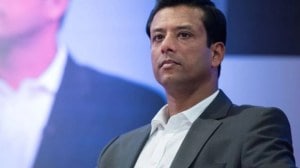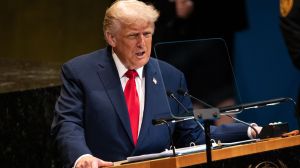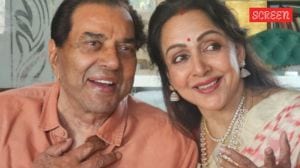Who after Oli? Names swirl, Nepal Army says committed to protect lives
Who will succeed Oli as interim Prime Minister? That’s the tricky question given the anger on the streets and the targeting of leaders across party lines.
 A protester celebrates standing at the top of the Singha Durbar, the seat of Nepal's government's various ministries and offices, after it was set on fire during a protest against social media ban and corruption in Kathmandu, Nepal, Tuesday, Sept. 9, 2025. (AP Photo/Niranjan Shrestha)
A protester celebrates standing at the top of the Singha Durbar, the seat of Nepal's government's various ministries and offices, after it was set on fire during a protest against social media ban and corruption in Kathmandu, Nepal, Tuesday, Sept. 9, 2025. (AP Photo/Niranjan Shrestha)With violent protests triggering the fall of the government in Kathmandu, President Ram Chandra Poudel, who appeared to be in the safe protection of the Nepal Army, Tuesday accepted the resignation of Prime Minister K P Sharma Oli. But there is uncertainty on how the situation will unfold in the coming days.
A press release by the President’s office said while Oli’s resignation has been accepted, he has been asked to continue until further arrangements are made.
The President’s act of asking the PM, whose fate and whereabouts are not known, to continue has baffled many in Kathmandu.
Dr Bhimarjun Acharya, a constitutional expert, said, “We have a situation that was not foreseen. Only an all-side consultation may lead to some kind of a solution. But for that, the agitation will have to come to an end, and normalcy restored. Life and rights of people have to be protected.”
Like Acharya, there are others who believe that the 10-year-old constitution, for all practical purposes, is now defunct, and an interim arrangement has to be the next move.
Who will succeed Oli as interim Prime Minister? That’s the tricky question given the anger on the streets and the targeting of leaders across party lines.
Sushila Karki, a former Chief Justice of the Supreme Court of Nepal, who has been actively speaking from public forums against corruption in high places and the judiciary, has been interacting with the Gen Z groups, expressing her solidarity.
There is speculation that Karki, or her predecessor Kalyan Shrestha, might stake claim to the post.
Both Karki and Shrestha are past the age of 70, and many are already pointing out that the appointment of either to the post after a movement by those below 30 will defeat its very spirit.
If the appeals being made by some of the Gen Z protesters are any indicator, Balen Shah, a rapper who studied structural engineering and later became the Mayor of Kathmandu, is a likely contender.
Thirty-five-year-old Shah has been an opponent of Oli, and has publicly called him corrupt. He has also supported the Gen Z movement. He said since he was above age 28, he would not lead the movement. It is said he turned down the Gen Z appeal to lead, and asked them instead to lead the government themselves.
नेपाली सेनाको अनुरोध #NepaliSena#नेपालीसेना pic.twitter.com/dlKTaEUwyG
— Nepali Army (@NepaliArmyHQ) September 9, 2025
In the meantime, the Nepal Army has appealed to the people and the Gen Z protesters to remain calm, maintain peace and protect private and government property. It reiterated it is committed to protect the life and dignity of citizens. At the same time, it indicated that it may act like a facilitator to promote peace and mutual conciliation to return normalcy.
- 01
- 02
- 03
- 04
- 05































